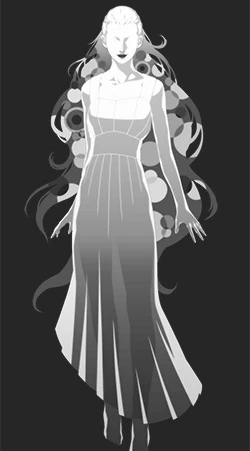However, the game's story fails to give the player a valid narrative reason to be doing what they are told to do in certain areas, by undermining the plot points and objectives it presents with a lack of characterization and by contradicting its earlier themes and messages.
MILD SPOILER WARNING: From here on in, this post contains opinions and information that may spoil the events of Shin Megami Tensei IV for new players or players that have not played certain routes.
 |
| Burroughs, a navigational AI who was designed to resemble the Goddess of Tokyo. |
The point of the above explanation is linked to my criticism of the game's story and its titular character, i.e. the Goddess, specifically in the Neutral route. The Law and Chaos routes do not contain these plot elements, as far as I know.
To start with, some of the first words you hear from her are "Revive me"... She says nothing else of note, other than expressing a vague desire to "watch over Tokyo", the meaning of which is unclear and apparently means nothing - she never specifies how she will watch over Tokyo, never states any moral principles or wishes, and is never even given any kind of personal history. I understand, to a degree, the story-writers' desire to keep her mysterious, but come on, give something to work with! What makes this goddess so special and so important to revive, other than being the Goddess of Tokyo? Does she even deserve that title after being revived? There are no indications that she plans to do anything concrete to help out the citizens of Tokyo after her revival - seemingly you are supposed to just feel warm fuzzies about reviving what is basically a divine damsel in distress. I don't know about others, but I just couldn't bring myself to care - which was disappointing, seeing as how starting down the Neutral route and finishing it require a fair amount of effort and attention in terms of the side quests you do, as well as the dialogue choices you make. The game almost pushes Neutral as "right" or "best" way to go, too, so naturally I wanted to do it on my first play through. There are some interesting concepts in play, like the notion that "Law" and "Chaos" are both kind of awful factions and ideologies in their own ways - the "Law" side, consisting of angels and other typically lawful divine beings, generally wants to keep humans under control through brainwashing and harsh, often violent punishment if they rebel or disobey, and the "Chaos" side, consisting of demons and other typically chaotic beings, believes in survival of, and domination of the weak, by the strongest, be they demon or human.
Both are extremes at the opposite ends of the spectrum, and although there is no real Neutral faction per se, the game's characters and thematic messages both push Neutral as the sensible, moral middle ground to take. Certainly it is less awful than Law or Chaos, but it ends up disappointing and unsatisfying nonetheless, as it basically boils down to, "kill everyone who opposes you from both factions, and then revive a Goddess you barely know anything about". I suppose there is a sense of temporary relief once it's all over, and humanity can be (mostly) free to pursue their own lives. But apparently gods and demons will always exist, so long as humanity wants them to, so the cycle of death and destruction will eventually rear its ugly head later, as evidenced by Shin Megami Tensei IV: Apocalypse. How am I supposed to feel anything for this Goddess I helped to revive? Maybe I'm not supposed to. Maybe it's just lip service to the title of the series. And that would be a damn shame.

No comments :
Post a Comment